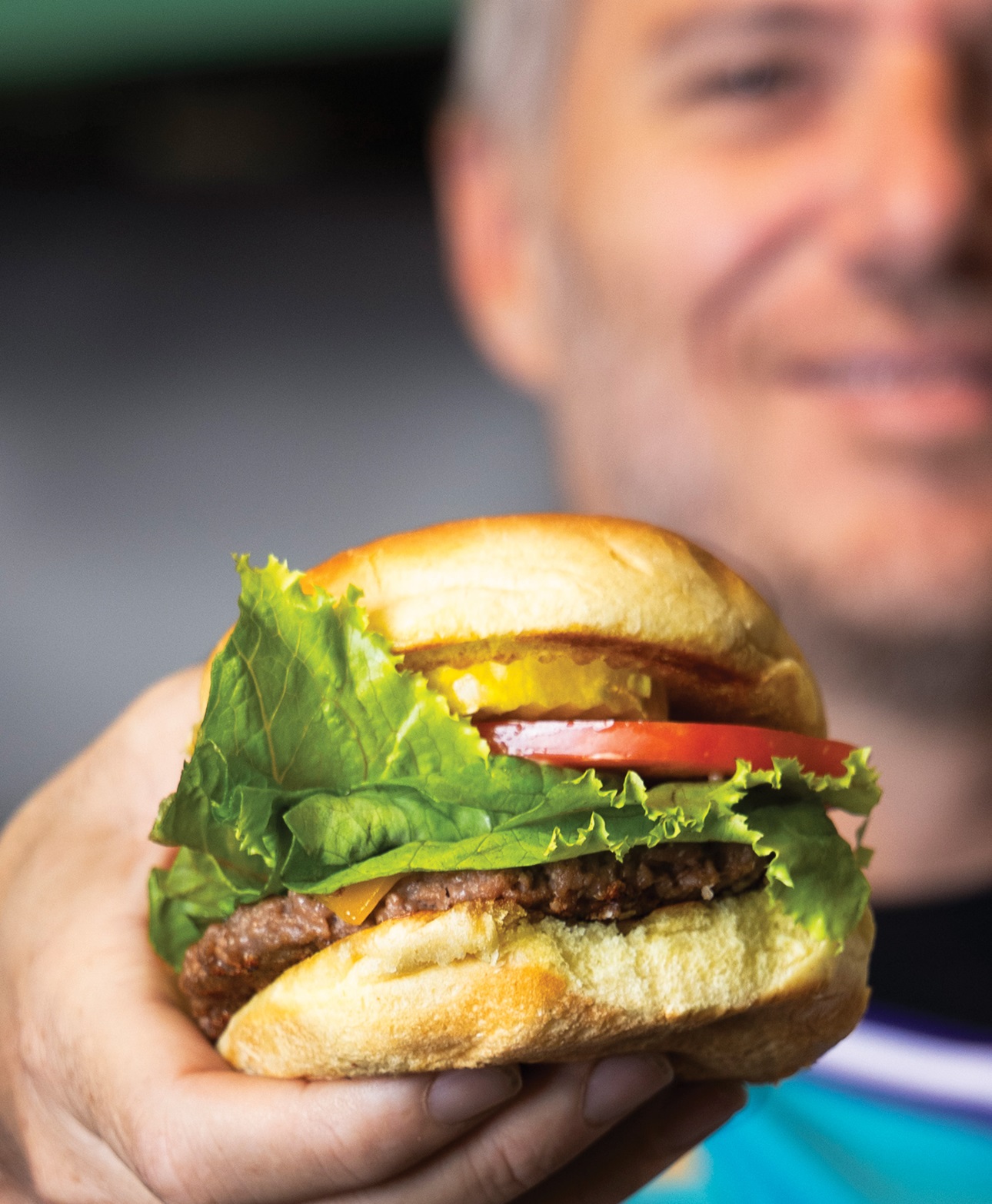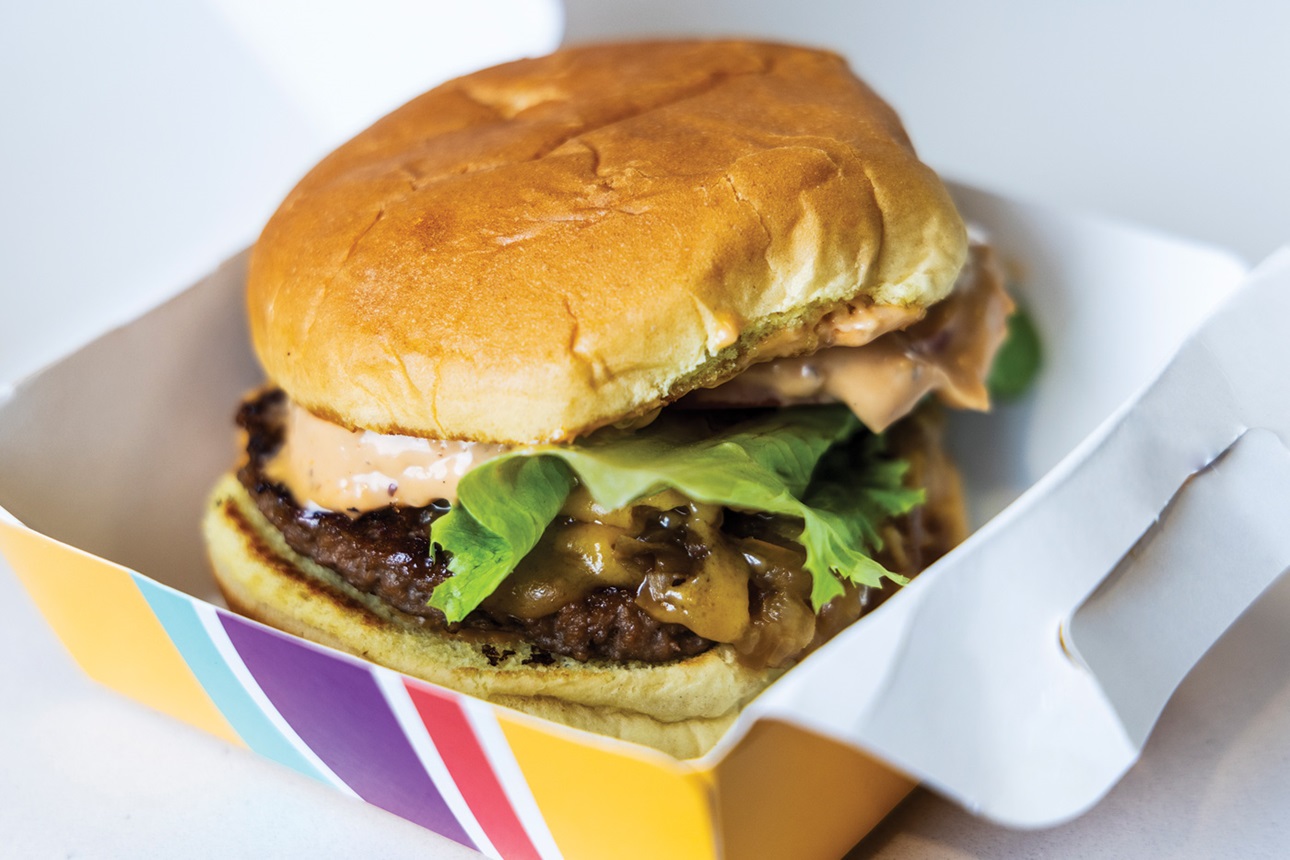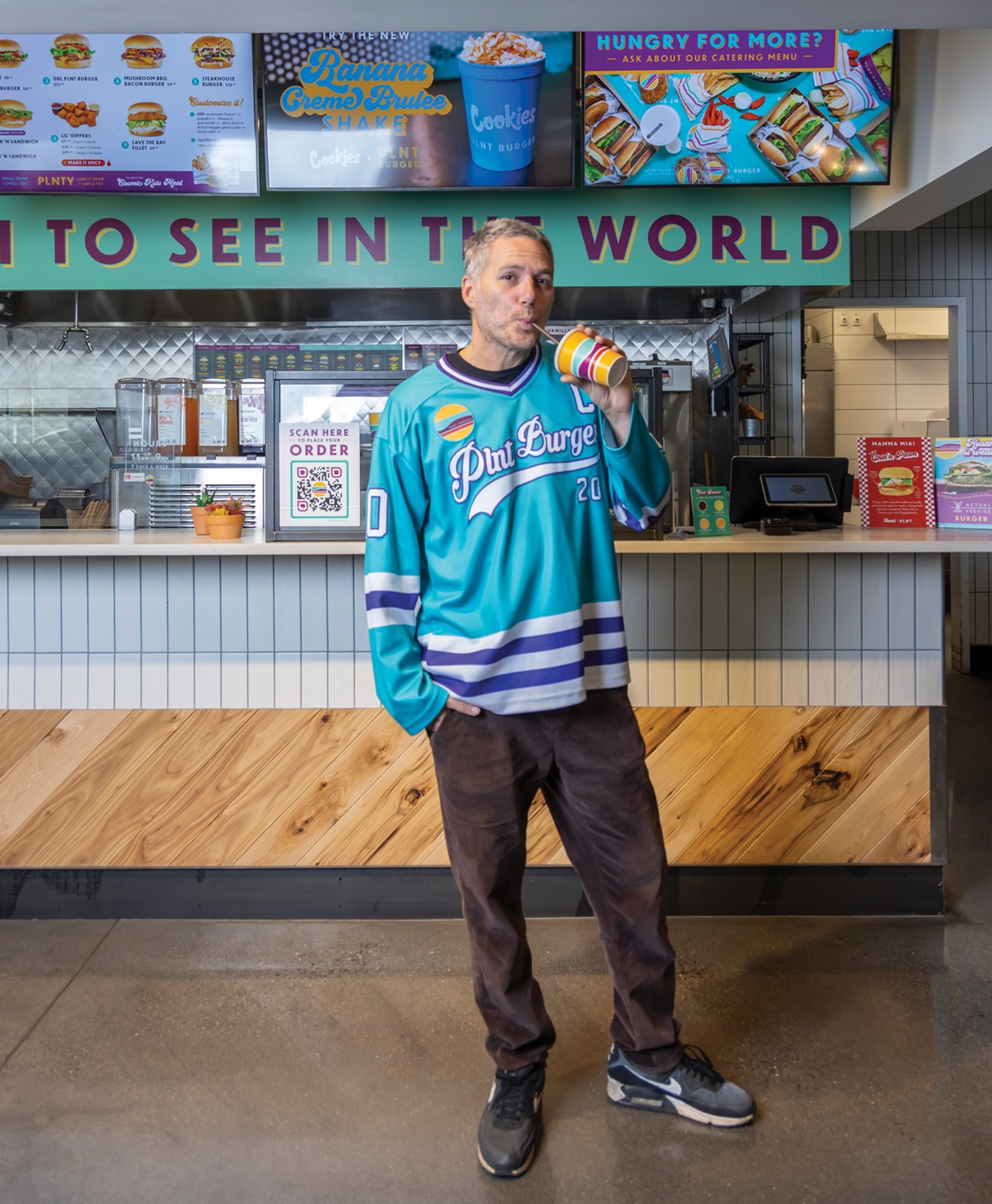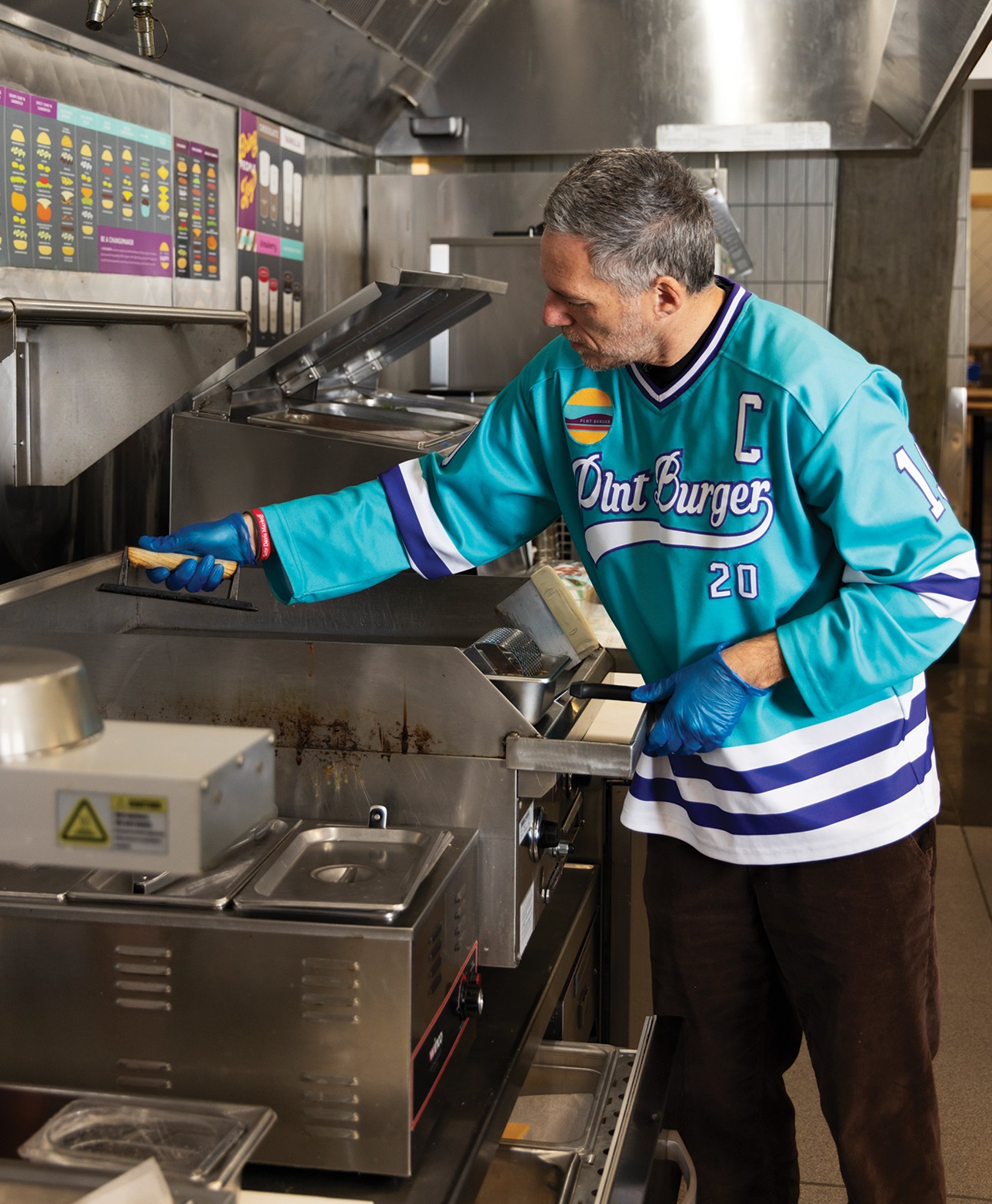Food Technology Magazine | Research
A Seat at the Table
Chef Spike Mendelsohn is a man with many missions—to advocate for an equitable food system, to help save the planet, and to show the world that plant-based burgers actually can be delicious.

Photography by Jennifer Chase
Spike Mendelsohn grew up in the restaurant industry—quite literally. He says some of his most vivid childhood memories are in his grandfather’s restaurant in Montreal, whether it was making a tableside Caesar salad for customers or washing dishes in the back of the house. Considering this upbringing, perhaps it's not surprising that he had a strained relationship with the restaurant industry for many years.
“I don’t think I fell in love with it,” he explains. “It was actually quite the opposite. It was taxing, and I had to work holidays and the weekends. I didn’t start glorifying the restaurant business until after I went to culinary school because I had never been near my peers in that capacity. I realized I have a craft that comes fairly naturally.”
It wasn’t long before the rest of the culinary world noticed his craft, too. After graduating from the Culinary Institute of America, Mendelsohn worked with world-renowned chefs and restaurateurs, such as Gerard Boyer and Thomas Keller. He appeared on the fourth season of Bravo’s Top Chef, and then later returned for Top Chef: All-Stars. He also competed on Food Network’s Iron Chef America and Beat Bobby Flay. His first restaurant, Good Stuff Eatery, opened in Washington, D.C. in 2008, and even served President Barack Obama. He now had a stage to showcase his expertise.
Mendelsohn has shifted focus in recent years by using his platform to advocate for a more climate-friendly food system, one that nourishes both people and the planet. Whether through his work with organizations such as CARE and DC Central Kitchen or his snack company, Eat the Change, he uses his knowledge of flavors and foods to help others find a seat at the table.
“There are smart people that care about the communities, and they need to be listened to,” he says. “We need to listen to what they're doing and hear them out.”
Food Technology spoke with Mendelsohn to learn more about his advocacy work on Capitol Hill, how he makes plant-based fast food that exceeds consumers’ expectations, and what steps chefs can take to use their voices for change.
Your work has shifted toward food advocacy and policy. What inspired that shift? Was there a defining moment?
It's always been part of my life, that give-back component. It was instilled by my parents. On Christmas, they would invite strangers to our restaurant from underserved communities and have a ton of presents under a tree for them. Now, as an adult, it's much stronger because I have a bigger picture in mind.
The perk of being in D.C. is that you can really involve yourself in a lot of stuff, whether it's food advocacy on a local level or even international level. Too much and too often we look at food as a privilege, and it's really a basic human right. The fact that there's so much food out there, and there's so much food that's wasted, and people are starving in the streets—it doesn't seem right at all. That’s why I do whatever I can do to uplift people. I always refer to cooking or this industry as kind of therapeutic.
Why do you think it’s important for chefs to think about their role in advocating for food security?
I think chefs, let's say even 20 years ago, were just guys in the kitchen. They weren't invited, and they never had a seat at the table if you will. And I think we've seen the evolution of the chef grow in the last 20 years. We've gone to having a seat at the table, being celebrities or rock stars, or having shows built around us, and now being policy advocates.
I think a lot of my peers like Michel Michaud, José Andrés, and Tom Colicchio, just to name a few, inspired chefs to learn that they have a voice that matters, and that constituents will listen to them because they are a trusted voice in the food world. To be able to use our perspective to help push policy that includes our food system and the lives of people, I think we deserve many seats at the table. That's why I worked so hard with CARE, one of the many organizations I work with. What I do is, I onboard chefs to learn that they have a powerful voice and that they can speak on behalf of the constituents, meet with lobby members, and push policy. That's from an international perspective, but then they can learn to localize that effort and can be that person in their local communities.
I've often used my work with policy as a positive distraction from the stressful work environment that I've decided to take on. Over the years, advocacy, policy, stepping outside the four walls of my restaurants and doing things for others has really improved my mental health, to be honest with you. There's this part of this give-back energy that you feel, and it's addicting. And that's what a lot of the chefs see when I get them to come to Capitol Hill, lobby, go into these rooms, and speak to the suits. I think we're just scratching the surface, and I think we've done a lot of work and a lot of people [are] talking policy and doing work in communities. I just think it's going to get even bigger.
Your PLNT Burger restaurant chain opened in 2019. Tell me about starting up this new venture and how you decided on plant-based burgers.
I met a gentleman named Seth Goldman, and he needs no introduction. He’s formerly from Beyond Meat and Honest Tea, and now he’s my cofounder at Just Ice Tea. But he introduced the Beyond Meat burger to me on a panel. My wife is vegan, so I took them back home and cooked them up, and she was over-the-moon excited because she hadn't had a burger in years. Well, happy wife, happy life, right? So I made that note in my head.
Seth and I were talking, and he had this great idea to open up PLNT Burger at Whole Foods because he had a lot of experience with Whole Foods. We put together this rock-star team that I've worked with in the past, and his family jumped on board.
We just sat down and said, “This is the future of fast food.” We can’t continue to do this aggressive style of farming [for] these fast-food restaurants. If you look at fast food, unfortunately, it's one of the things that contributes to a lot of the health crisis that we have. If we can encapsulate that, that the fun of eating fast food [that is] better for you, I think there's something interesting there.
What’s your secret to successfully reaching consumers with plant-based products?
The product has to be great and perform properly. And then it's about just understanding flavors and what makes flavors pop in people's palates. That can be anything from textures to sweetness to spices to saltiness, incorporating all of these textures and all these different things that get your palate excited. That how we make food delicious.
So we have a burger on the menu, and it's a Beyond Meat patty. It's got an onion schmear, which just gives this body to the burger, like a full-bodied mouthfeel and sweetness. Then we have this fantastic homemade barbecue sauce, and we put fried onion rings on there for texture. And then you have this buttered bun, so it’s rich. It’s about just knowing how flavors meld together.
It's not my first rodeo in the burger department. I have Good Stuff Eatery, which is not a vegan burger place. And I am the Burger Bash king. I won many burger battles. We know what we're doing.
How has your advocacy work informed your cooking?
In general, I'm a flexitarian. So the meat-eating occasions need to feel pure, and we need to know where that stuff is coming from. Advocacy really made me look at sourcing, to look one step past the grocery store and the label.
[It’s also about] eating more vegetables. I go to all these international communities, and I see their diets. They have very little protein involved because it's so expensive, so they use many different things to get the nutrients. … But I think that, above all, for me advocacy has just made me look at the system of food and where it needs help.
And conversely, how are you using your restaurants as a conduit for your food advocacy work?
So with burgers specifically, it's a rallying cry for people to look at their daily intake a little differently and more specifically, their favorite food, which is fast food. America loves fast food. If we could change the thought process that fast food needs to come from these huge animal factories, where the carbon emissions are out of control and they're really affecting the planet, I think that's where PLNT Burger comes in. We're fighting climate change one bite at a time through the lens of food.
And that's not what we lead with, because there's so much stuff out there about climate change. I think people are really tired about even hearing the words “climate change.” So we lead with deliciousness. If we can make something just as delicious, if not better than what you're used to, then why wouldn’t you take a bite out of our offerings rather than other people's, right? Because, on top of that, [our] bite is much easier on your digestive system. It's better for your health, it's got less saturated fats, it's got lower sodium.
When people look at food, it's a very easy relationship. They want it to taste delicious, and they want it to sustain them. That’s the kind of shift that we're trying to have.
You’ve also entered the product development space with Eat the Change, a company that makes nutrient-dense snacks. Tell me about your ingredient choices and how that adds to the brand’s mission of planet-friendly eating.
Eat the Change has had some crazy growth in the last year, which is really starting to shift how we operate and what we're going to start as a snack company. Mushroom jerky was our first foray, and we gave it a good go, but what we realized is that it's a very decentralized market, mushroom lovers. We gave it a good ride, and we just discontinued it as of about a month ago.
But carrots, for instance, was another super sustainable, water-efficient crop. And we have these Cosmic Chews that are for kids. We're disrupting the fruit snack category, which is very much due for a lot of disruption. So what we did is set out to be more than a fruit snack. We use carrots, sweeten it with apple juice concentrate, and we flavor it. Three simple ingredients, none of the other stuff. Then we dehydrate it, and it turns into this amazing, chewable, delicious treat that eats like a fruit snack. It has key nutrients and fiber, and it’s good for the planet.
And then while we were developing our snacks, Seth got a phone call from Coca-Cola that basically changed Eat the Change overnight. We quickly became a tea company, which makes up about 95% of our business right now. And that's due to all the hard work that Seth and his team did with Honest Tea. They were very early in the space of a premium, organic tea. But that's why as soon as Coca-Cola dropped it, we were able to pick it up as Just Ice Tea, a new brand that stands for justice, not just by the farmers but just by everybody.
It's been a blessing in disguise for us. We had to shift a couple things around, get rid of our mushroom jerky because we can't tackle too much, and continue to work with the two [products], which we think have a huge potential to be successful.
You’ve mentioned in previous interviews that you care about mission-based entrepreneurships. How can food companies ensure they are meeting their mission while satisfying consumers?
They have a hard fight ahead of them, especially for companies that have existing products that maybe don't fall in line with this new mission that we're driving. It takes guts to really go after properly.
I think companies, if they're serious, they probably should be restructuring their boards to be able to have that voice at the table that is pushing an agenda. I don't think just buying your way to carbon credit is the right route. It’s the guilt-free tax, I'd say. And I think they should follow the demand of consumers. I use the dairy analogy a lot because that's something that really worked with people. There’s been a shift in where people get milk from, and I think we saw the market share that plant-based milks just took from the dairy section. And so you see things like that happening, and companies start to pay attention. I think that one of the most massive shifts in people's habits when it comes to food and beverage is their milk. All of a sudden, every Starbucks in the world or anywhere you go asks what kind of milk you would like. I just think that shows that when there's a consumer demand for something, and when it makes sense and doesn't sacrifice on taste or flavor, that's how you get people in.
You are the first chairman of DC Central Kitchen. What kind of work does DC Central Kitchen do?
They are one of the organizations that I love working with the most. What they do is they take formerly incarcerated people and give them another chance to learn some skills for the workforce. So it's culinary school. They put [the students] through a 12-week course of learning how to prep and make meals. And while they're in that course, the meals that they are making are feeding the homeless. It's a super sustainable process of onboarding, giving people a second chance, and then getting them, while they're doing the curriculum, to help people in need. And then we help with job placement after that. It's just a fantastic organization, and just speaks volumes to how I like to see things operate.
What is the benefit of doing this kind of work on a municipal/local level?
National federal policy takes time. You can have the most effective, quick change locally. And you need both, don't get me wrong. But the local efforts are what really count, and I think you really see the fruits of the labor. I think in this day and age we bear the weight of the world in the palm of our hands, because we have an iPhone or a smartphone. I don't think that's how we're supposed to be wired. So for me, focusing everything more and more locally, it makes more sense. Focus on your local news, what you can do to get involved, and where people are asking for help. I think it's a lofty dream, but I think there's places where we could do that. It doesn't mean we have to throw away our smartphones. We just have to do things a little differently.
I really appreciate how you mentioned giving people a seat at the table. Why do you think listening is such an integral tool in food advocacy?
That's one thing that I really loved about the Policy Council in D.C., because it was a piece of legislation that was backed by the government—by all branches of government. There's 12 members, and the legislation covers urban agriculture, sustainable agriculture, jobs, and food deserts. And part of the organization’s program is to invite constituents so we can listen to them, hear them. So we have these ongoing forums between the 12 members, the community, and the branches of government. The Food Policy Council for me was the first time ever that everyone's talking together at the same time. Usually, you have government doing their thing with their data, you have community members feeling like they weren’t being heard, and then you have all these policy buffs that had their individualized organizations. But we should listen to the community because they're the ones that are affected every day. So that's why listening is super important.ft












.jpg?mw=500&hash=D1E2E8B94FED0CCA2F5CEA8243FD787B)